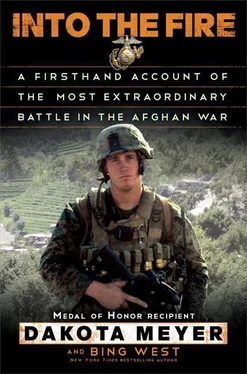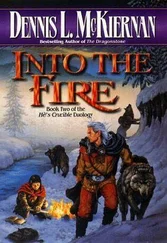On one exercise, five of us were sent into the wilds with a map and blanks in our rifles to stalk and simulate killing a guerrilla leader. The instructors gave us a can of mace in case we crossed a bear. To avoid enemy patrols, we dug hide sites to sleep in during the day and moved at night through snow-capped passes. The second day, we came across some bear scat.
During the third night, we were walking silently on pine needles through a moonlit forest—it’s beautiful up there—when the point man thrust up his right hand. We froze and looked every which way. There in the soft earth next to us were enormous paw prints. Not one of us breathed for the next five minutes. It was so quiet you could hear the moon moving overhead. Suddenly our point man leapt up and ran back to us, his hand clenched like a claw.
Bear!
We froze, looking at the shaggy, crouched monster about to tear us apart. I glanced around and concluded I’d never have time to climb the nearest tree, plus bears climb trees as well and are a lot better than I am at it. We waited like mice for the bear to choose its first victim. After about fifteen seconds, we realized we were looking at a moss-covered stump.
The next day, we found the guerrilla camp and took one shot—a bull’s-eye.
When I rejoined my battalion in Hawaii in mid-2008, I was put in charge of my own six-man sniper team. We were tight. When others were around, my team called me Corporal and came to parade rest to report. When we were alone, I told them not to do any of that stuff. We were like the Army Special Forces. We knew our jobs and were relaxed with each other, using first names.
While my battalion was set to go back to Iraq, I figured they would be in a backbench situation. By late 2008, the American battalions in Iraq had pulled back to remote bases. They were no longer conducting combat patrols.
When headquarters asked for volunteers to serve as advisors in Afghanistan, I signed up. I knew that would mean action.
“The Afghans won’t have your back, Corporal,” my platoon commander warned me. Sergeants who had served in both countries told me the Afghan soldiers were worse than the Iraqis. They called the Afghans pogues, a slang term meaning unreliable and undisciplined.
Just the same, I was looking forward to the adventure. As a sniper with mountain training behind me, I was confident I could handle whatever came my way.
I flew to Okinawa, where I joined an advisor team. In Marine language, that’s Embedded Training Team 2-8. Four of the other nineteen team members on ETT 2-8 were infantrymen, and I was the only sniper. Because the infantry battalions were committed to Iraq, most advisors were non-infantry Marines stationed on Okinawa. Since World War II, the Marines had maintained a base on the Japanese island, a thousand miles south of Tokyo.
I flew to Okinawa, where our ETT spent a month concentrating on the basics of fire and maneuver. We didn’t know each other and I wasn’t impressed with our makeshift workup. We would soon be advising a veteran Afghan battalion fighting in the mountains of eastern Afghanistan, but we didn’t follow a serious program of instruction for going to war.
From Okinawa, we flew to the mountain warfare camp in California’s High Sierras to acclimate. Since I knew the terrain from my previous deployment at the sniper course, I was usually placed at point on the patrols. During the day the instructors would harass us, shooting blanks from a distant hillside or a thickly wooded draw, and then withdrawing before we could engage them. That was solid training, exactly what was needed to simulate what we would encounter in the mountains of Afghanistan.
In the evening, though, we bedded down without security, as if every combat patrol ended at sundown. We set up lean-tos, spread out pine branches as mattresses, took off our boots, boiled our favorite noodles over bright campfires, and went comfortably asleep under the stars. All we lacked were marshmallows.
I couldn’t restrain myself from bitching. My previous sergeants would have kicked my ass down the mountain for camping out Boy Scout style.
Second Lt. Ademola Fabayo, a New Yorker whose parents immigrated from Nigeria, was the operations officer on our ETT, although he did not have infantry training. My focus upon tactics exasperated him.
“We’re not going there to fight, Meyer,” he said. “Our job is to train the Afghans. They do the fighting, not us.”
Back then, and even today, I didn’t understand how we could train Afghans in a combat zone while avoiding the fight. There was a huge problem with that theory. In our field exercises, the enemy were American role players with fake bullets; in Afghanistan, the enemy were genuine Taliban fighters. Things came to a head on the last patrol. Everyone was tired as we came down the hill, heading toward warm showers and decent food. The patrol leader left four stragglers on the hillside to wander in by themselves. As we were putting away our weapons, I complained about the haphazard ending. For three years in the infantry, it had been pounded into me to be precise and disciplined. No slack, no shortcuts.
First Sgt. Christopher Garza, the team’s senior enlisted man, was a strict but fair man. In retrospect, things might have turned out differently if I had used diplomacy, appealed to his human side, recited my Tinker Bell speech, and got him to smile. Instead, I charged straight ahead and blurted out what I believed.
“We need a debrief to correct our errors, First Sergeant,” I said.
“Damn it, Meyer,” Garza yelled back. “I’m tired of your negative attitude.”
Uh-oh. It was too late for Tinker Bell.
“I’ve had it with you!” he screamed in front of the team. “Load up your gear and get down to the flight line. You’ll sleep on the runway tonight and stay away from us. You’re off the team.”
A few hours later, Garza calmed down and let me stay on the team. We didn’t resolve our fundamental difference. I was still confused. Were we to act as garrison instructors or combat advisors? Either way, we were on our way to Afghanistan.
When we arrived in Afghanistan in the summer of 2009, it was 1st Sgt. Garza who assigned me to Lt. Mike Johnson’s four-man team at Monti, ten miles north of Joyce. That way, headquarters didn’t have to put up with me on a daily basis, and I’d get all the action I wanted.
Lt. Johnson assigned each of us a specific job. He took on the tasks of improving the leadership procedures of the Afghan officers and coordinating our activities with those of Dog Company. He was the perfect guy for that job—sunny and smiling, with an easy laugh, but completely professional, with the highest standards. I had climbed mountains with him in California, of course, and I knew he was as strong physically as he was mentally. On that first trip up to Monti, when he was saying the mountains looked good for hiking, I knew he could probably give those mountain goat dushmen a run for their money to the top of the ridge if he wanted to.
Staff Sgt. Aaron Kenefick was a personnel specialist with eight years’ expertise in administration, so his job was to bring some order to the Afghan personnel procedures and pay records. That sounded like herding cats to me, but he was the man for it, as he cared about doing things right and made you care about it, too.
He would have quite a challenge, as the Afghan Army is not what you would call a tight ship. For example, they have no visible penalty for desertion: soldiers collect their pay, declare themselves on leave, and come back when they run out of money, if they come back at all. Starbucks runs a tighter ship than the Afghan Army. Faced with a turnover of 8 percent per month, molding a fighting unit was almost out of the question. But if anybody could get their records straight, Aaron could.
Читать дальше












